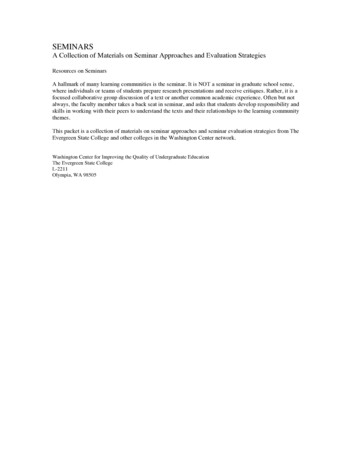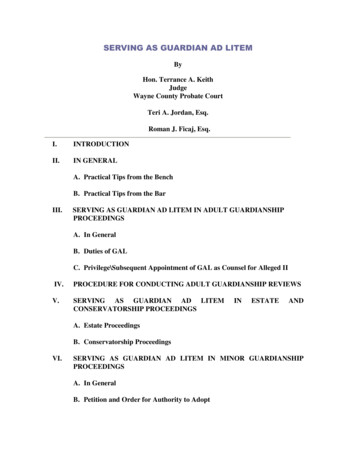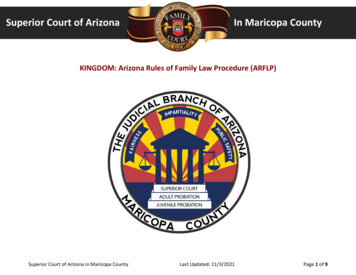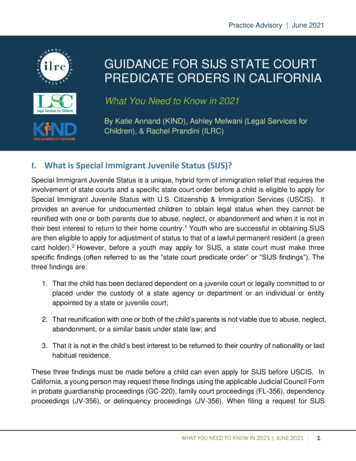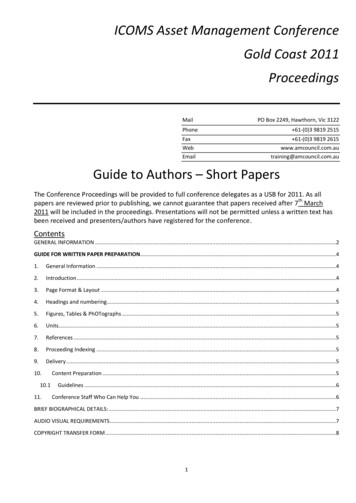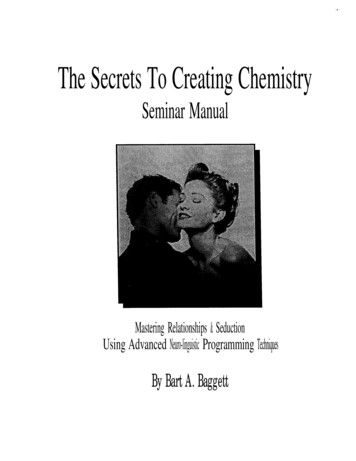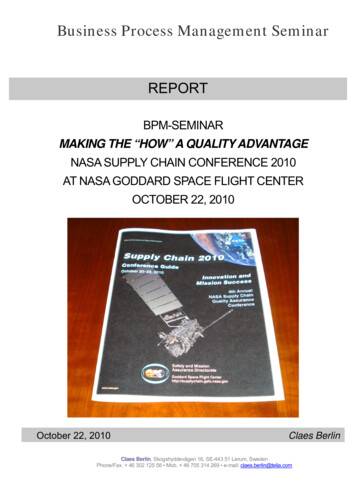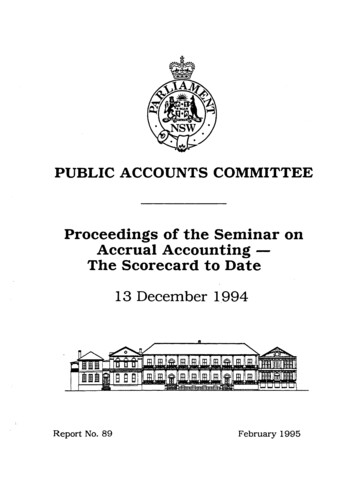
Transcription
PUBLIC ACCOUNTS COMMITTEEProceedings of the Seminar onAccrual Accounting The Scorecard to Date13 December 1994Report No. 89February 1995
This report was compiled using Wordperfect for Windows 5.2,and printed by the Parliamentary Printing Services.Covers printed by the Clarendon Printing Pty Ltd.Copies of this report have been distributed toall legal deposit libraries in Australia.Copies of this report may be obtained from:Government Information ServiceGoodsell Building8-12 Chifley SquareSydney 2000Telephone (02) 752 1111New South Wales Parliamentary Library cataloguing-in-publication data:Seminar on Accrual Accounting: the Scorecard to Date (1994: Sydney, N.S.W.)Proceeding of the Seminar on Accrual Accounting: the Scorecard to Date, 13 December 1994. -[Sydney, N.S.W.] : Public Accounts Committee, 1995. -- 95 p. ; 30 em. (Report I PublicAccounts Committee ; no.89)At head of title: Parliament NSW, Public Accounts CommitteeISBN 0 7310 2170 31.Accounting--Congresses (LCSH)2.Public administration--Financial aspects--Congresses (LCSH)[1.ACCOUNTING-CONFERENCES (Parliamentary CTS-CONFERENCES (Parliamentarythesaurus)]I.New South Wales. Public Accounts CommitteeIT.Titleill.Series: New South Wales. Parliament. Public Accounts Committee. Report ; no.89350.7231 (DDC20)
Public Accounts CQmmiUee SecretariatPatricia Azarias, MPA Princeton, BA(Hons) Oxon., BA(Hons);DirectorDavid Blunt BA(Hons), M Phil SydneySenior Project OfficerJozef Imrich, BA Deakin;Clerk to the CommitteeCaterina SciaraAssistant Committee OfficerKendy McLean, BAAssistant Committee OfficerJohn Lynas, FCPA,Accounting and Auditing AdvisorAuditor-General's OfficePublic Accounts CommitteeParliament HouseMacquarie StreetSydney NSW 2000Telephone (02) 230 2631Facsimile (02) 230 2831
MEMBERS OF THEPUBLIC AC.COUNTS COMMITIEEMr Ian Glachan·, MP ChairmanThe Liberal Member for Albury since1988, Ian Glachan has had a variedbackground. He served five years at seaas a marine engineer, was a farmer forten years, and operated a newsagency inAlbury for 18 years. Mr Glachan is alsoa past president of the Albury-HumeRotary Club and a Paul Harris Fellow,an active member of the AnglicanChurch, and the Legislative Assemblymember on the Board of Governors ofCharles Sturt University. Otherparliamentary responsibilities includeChairmanship of the Minister's AdvisoryCommittee on Health, and vicechairmanship of the Minister's AdvisoryCommittee on Roads and Transport. MrGlachan was elected Chairman of theCommittee on 15 September, 1994.Mr Peter Cochran, MP, ViceChairmanFollowing a background in farming, theArmy, the Commonwealth Police,ASIO, and the Cooma-Monaro ShireCouncil, Peter Cochran won the seat ofMonaro for the National Party in 1988.His other parliamentary responsibilitiesinclude the chairmanship of theMinister's Advisory Committee on Landand Water Conservation, deputychairmanship of the Committee forPolice and Emergency Services, andmembership of the committee for theEnvironment and the Select Committeeon Public Sector Superannuation. He isalso the Premier's representative on theAnzac House Trust and the AnzacMemorial Trust.Mr Geoff Irwin, MBA,ProdEngCert, DipTech, DipEd,MPGeoff Irwin was elected to Parliament inMarch, 1984 as the Labor Member forMerrylands, and he has been theMember for Fairfield since March 1988.Before entering Parliament he worked inindustry as a planning and supplymanager and taught business studies atT AFE. He served as a member of theSelect Committee upon Small Businessand as Opposition Spokesperson onBusiness and Consumer Affairs.Resigned from Parliament on 24 January1995.Mr Terry Rumble, FCPA, MPTerry Rumble was elected LaborMember for Illawarra in March 1988.Before entering Parliament he qualifiedas an accountant and was employed inpublic practice and in the coal miningindustry. He has served as a member ofthe Regulation Review Committee and isthe Chairman of the Leader of theOpposition's Backbench Committeewhich involves Treasury, arts and ethnicaffairs.Mr Andrew Humpherson, MPThe Liberal member for Davidson sinceMay 1992 Andrew Humpherson wasDeputy Shire President of WarringahShire Council having served severalterms on the Council. Mr Humphersonwas an Area Manager for Shell. He hasalso worked as an Engineer for Repcoand Shell. He holds a degree inChemical Engineering from theUniversity of New South Wales. Hisother parliamentary responsibilities have
included the Chairmanship of the SelectCommittee on Motor Vehicle Emissions and Legislation Committee upon theEndangered Species Bill. He has servedas a Member of Select Committee intoWater Board, State Owned Coal Mines,Bushfires and the Joint Committee on theOffice of the Ombudsman.The Public Accounts CommitteeFrom left: Terry Rumble, Andrew Humpherson, Ian Glachan (Chairman), Geoff Irwin(Resigned from Parliament on 24.1.1995), Peter Cochran (Vice-Chairman)
Accrual Accounting SeminarCONTENTSCHAIRMAN'S FOREWORD . . . . . . . . . . . . . . . . . . . . . . . . . . . . . . . . . . . . iSUMMARY OF SIGNIFICANT ISSUES. 1OPENING ADDRESS . . . . . . . . . . . . . . . . . . . . . . . . . . . . . . . . . . . . . . . . 3Introduction by Ian Glachan, MP, Chairman of the Public Accounts CommitteeTHE STATE OF THE ART IN PUBLIC SECTOR FINANCIAL MANAGEMENT . 7Andrew Tink, MP, Parliamentary Secretary to the PremierTHE VIEW OF THE TREASURY AS THE REGULATOR . . . . . . . . . . . . . . . . 15Thuy Mellor, Assistant Secretary, NSW TreasuryVIEWS FROM A SMALLER AGENCY . . . . . . . . . . . . . . . . . . . . . . . . . . . 23Ken Brown , Director, Department of Sport and Recreation and RacingTHE VIEW FROM THE COAL FACE- THE EXPERIENCE OF LARGE AGENCIES . . . . . . . . . . . . . . . . . . . . . . . 29Ken Dixon, Deputy Director General (Resources), Department of SchoolEducationDEPARTMENT OF HEALTH PRESENTATION . . . . . . . . . . . . . . . . . . . . . . 39Ken Barker, Director of Finance, Department of HealthOUR FRIENDLY AUDITOR WANTS TO SAY. . . . . . . . . . . . . . . . . . . . . . . . 53Tony Harris, NSW Auditor-GeneralWHAT DOES IT ALL MEAN? . . . . . . . . . . . . . . . . . . . . . . . . . . . . . . . . . 59Professor Bob Walker, School of Accounting, University of NSWTHE CHIEF EXECUTIVE'S VIEW . . . . . . . . . . . . . . . . . . . . . . . . . . . . . . 69Professor Carrick Martin, Deputy Vice-Chancellor (Administration), MacquarieUniversityOPEN FORUM DISCUSSION . . . . . . . . . . . . . . . . . . . . . . . . . . . . . . . . . . 81APPENDIX ONE:List of attendees at the SeminarPublic Accounts Committee
Ian Glachan MPAccrual Accounting SeminarCHAIRMAN'S FOREWORDThe aim of this report is to present an account of the progress made to date in theCommittee's inquiry into the implementation of accrual accounting in the New SouthWales public sector.Over many years the Public Accounts Committee has taken a keen interest in the refonn ofPublic Sector fmancial management and has actively supported the implementation of accrualaccounting throughout the public sector. This most important and fundamental financialrefonn has not been a politically divisive issue in New South Wales; indeed successivegovernments have adopted and then promoted accrual accounting with increasing enthusiasm.New South Wales can be seen to be at the forefront of refonns in fmancial management ofthe public sector, notwithstanding some criticism from some quarters. However, there arestill several outstanding issues that need to be addressed if the implementation of accrualaccounting is to be brought to a successful conclusion. Two of these stand out. These are the need for some specific accounting standards for particular accounting issues and the need to improve the skills and training for accounting and finance officers.During the inquiry, the Committee will be closely examining these issues.This Seminar was the starting point for this inquiry. Our thanks and appreciation are dueto the many officers in departments and authorities who came along and participated. Bysharing our views and experiences we can all gain from the collective experience over a widerange of departments and authorities.To our panel of speakers, a special acknowledgment for the time and effort taken to preparetheir papers and to prepare for the open forum session. The Committee is pleased that sucha high level of expertise can be readily found from within the public sector.To my fellow members I acknowledge the usual bi-partisan approach to the work of theCommittee. This is the strength behind the success of our work and is of special importanceat this time as we approach the forthcoming state election. To the staff of the Committee,a special note of appreciation for organising the seminar in addition to their nonnal duties.We specially appreciate the contribution of John Lynas, Adviser from the Auditor-General'sOffice, who identified the topics and organised the speakers; Debbie Isted and CaterinaSciara handled the booking and registration of delegates in their usual efficient manner; toKendy McLean for editing and compiling the transcript of the· proceedings we owe a specialvote of thanks; and, as usual, Patricia Azarias, the Director, supervised the operation.I"!1 .1---. Ian Glac: MP"ChairmanFebruary 1994Public Accounts Committeei
Accrual Accounting SeminarSUMMARY OF SIGNIFICANT ISSUESThe implementation of Accrual Accountingacross the New South Wales public sectoris one of the most significant and farreaching reforms in financial managementto have occurred in Australia in the pastSO years.The New South Wales public sector isranked among the leaders in the world inreform of financial management in thepublic sector. However, notwithstandingthe progress achieved to date, there are anumber of outstanding matters that stillneed to be resolved. The first of theseissues relates to accounting standards andthe second relates to the accounting and ·reporting requirements for the PublicTrustee.In relation to accounting standards, thereare two issues that remain unresolvedwhich have been the subject of commentby the Public Accounts Committee inprevious reports. The first relates toaccounting standards for infrastructure andthe second relates to the external reportingrequirements for public trustee operations.In several earlier reports, particularlynumbers 73 and 80, the Committeeinquired into and reported on the privatesectors involvement in public sectorinfrastructure. The Committee noted thatone of the barriers to increasedinvolvement by the private sector was thedegree of uncertainty as to the appropriateaccounting treatment to report on thebusiness arrangements. The Committeenoted that in several instances (forexample, the Roads and TrafficAuthority's involvement in the SydneyHarbour tunnel and the private sectorPublic Accounts Committeetoll ways), the RTA, the Auditor-General,the NSW Treasury and several Big Sixaccounting finns were not able to agree onthe appropriate accounting treatment.The Committee is finnly of the view thatthis matter needs to be quickly resolved.In this regard the Committee was pleasedto note that the Australian AccountingResearch Foundation is in the process ofpreparing an issues paper on this topic andthat a project advisory panel is to beestablished to support this project.The second matter still outstanding and ofcontinuing concern to the Committee is theaccounting and external reportingrequirements for publicly owned andconducted trustee operations. In reportNo. 82 the Committee undertook followup action on a number of matterspreviously reported to Parliament by theIn these reports theAuditor-General.Auditor-General had indicated his concernat the high level of earnings that areretained by the Public Trustee.TheCommittee recommended a number ofchanges to the reporting and reviewrequirements imposed upon the PublicTrustee and recommended that a newAccounting Standard be developed forpublic trustee operations.1
Accrual Accounting SeminarJan Glachan MPMr Ian Glachan, MPChairman of the Public Accounts Committee2Public Accounts Committee
Acc1111ll Accounting SeminarIan Glachan MPCHAIRMAN'S ADDRESSIntroduction by Ian Glachan, MP, Chairman of the Public Accounts CommitteeGood morning ladies and gentlemen. Myname is Ian Glachan and I am Chairman ofthe New South Wales Public AccountsCommittee. It is my great pleasure to beable to welcome you here this morning onbehalf of the Public Accounts Committeeand to the New South Wales ParliamentHouse for our seminar on accrualaccounting, which we have entitled "TheScorecard to Date".I want to extend a very special welcome tomy colleagues from other parliaments, andI believe it is quite fitting that today in theoldest parliament in Australia we shouldbe hosting this seminar.I am pleased to note that New South Walesis seen as a leader in the process of reformof rmancial management in the publicsector and that the parliament itself,through the Public Accounts Committee, isa major player in the refonn process.Let me introduce to you, firstly, two ofmy colleagues on the New South WalesPublic Accounts Committee, Mr AndrewHumpherson, Member for Davidson, andMr Terry Rumble, Member for Illawarra.Our first speaker today is the fonnerChairman of the Public AccountsCommittee, now Parliamentary Secretaryto the Premier, Mr Andrew Tink, Memberfor Eastwood.I would also like to just offer a veryPublic Accounts Committeespecial welcome to our colleagues fromVictoria, first of all to Mr Ross Smith MPand Mr Tony Plowman, my neighbourwhose seat of Benambra faces my seat ofAlbury across the Murray River.I would also like to welcome Mr FenwellMLA, a member of the Queensland PublicAccounts Committee, and a very specialwelcome to Mr Bill Warne, the FinancialController of the Albury City Council, theman who makes sure that the rates I payare put to good use.We also have Treasury officers from theCommonwealth and other States andTerritories here today, and I extend a verywarm welcome to them.I am pleased to acknowledge Thuy Mellor,who is here standing in today for theSecretary to the New South WalesTreasury, Mr Mike Lambert. Thuy waslast week nominated for a special honouras Government Accountant of the year - avery special honour indeed. That is anaward sponsored and promoted by theprofessional accounting bodies and the"New Accountant" magazine.MrsMellor's achievements in public sectortmancial refonn are at the heart of thetopic we are discussing today, and I mightadd that although the fmal of the awardwent to Sydney Tax Commissioner DennisCortese, it is no shame at all to be pippedon the post by the taxman. That happensto a lot of us. I do extend my3
Ian Glachan MPcongratulations to you on your nomination.The importance of our seminar today isdemonstrated by the wide range oforganisations represented, Public AccountsCommittees from the Commonwealth andother States, staff from Auditors-General'sOffices across Australia and professionalaccountants from private sector firmsoffering their expertise to the publicsector. You are all welcome and I amconfident that you will add your collectivewisdom and knowledge to the seminarproceedings.Last, but not least, I welcome accountingand fmancial professionals from the threetiers of government - Federal, State andlocal. You have all carried the brunt ofthe hard work that is needed inimplementing these changes in reforms andyou are all very welcome; and Iacknowledge your consideration to thetopics we will discuss today.Accrual Accounting SeminarAndrew's career in Parliament hasincluded membership of a wide variety ofparliamentary and government committeesas well as being Chairman of the JointParliamentary Committee on the Office ofthe Ombudsman. He has served as atemporary Chairman of Committees andDeputy Speaker of the LegislativeAssembly, and is the representative of theParliament on the Council of MacquarieUniversity.While Chairman of the Public AccountsCommittee he was a dynamic leader.Those who served with him alwaysadmired his analytical mind, his dedicationand particularly his dedication to publicaccountability and efficiency. Ladies andgentlemen, will you please welcome MrAndrew Tink.My personal thanks go to myparliamentary colleagues and to thedistinguished speakers that we have today,all of whom are very highly regarded intheir own fields.Now, as Chairman of the Public AccountsCommittee, it is my great pleasure tointroduce to you our first speaker who willopen the conference, and that is mycolleague Andrew Tink, Member forEastwood, formerly Chairman of theCommittee, and now ParliamentarySecretary to the Premier. Andrew waselected fll"St in 1988 as the Member forEastwood and before entering parliamenthe practiced as a barrister in equity,commercial and shipping law.4Public Accounts Committee
Accrual Accounting SeminarPublic Accounts CommitteeIan Glachan MP5
Accrual Accounting SeminarAndrew Tink MPMr Andrew Tink, MPParliamentary Secretary to the Premier6Public Accounts Committee
Accrual Accounting SeminarAndrew Tink MP"The State of the Art inPublic Sector Financial Management"MR TINK: Thanks very, much Ian. Ifirstly would like to congratulate IanGlachan and the Committee for continuingwhat has now become a tradition ofseminars in Parliament House relating topublic accountability issues. We keep arecord of what is said here and it is goodto look back on it from time to time andsee what people have said in the past.I was looking at a seminar that the PublicAccounts Committee hosted in this roomback in February 1988. It was a seminaron accrual accounting, and the thenTreasury Secretary, Percy Allan,addressed the gathering and his topic was"Accrual Accounting, To Be Or Not ToBe". He started out by saying that hedidn'tthink accrual accounting ingovernment departments was a clear cutissue in terms of whether or not it shouldproceed and he expressed I think fairlystrong personal reservations and strongreservations of the government of the dayabout whether or not accrual accountingwas a good idea. He certain!y thought thatit would be a formidable administrativetask and not something that could be donewithout a lot of cost.He identified a number of other areaswhere he thought the priority lay and healso took the view that accrual accountingwas something that ought to take a lowerpriority than any of those issues. So thatwas the position at a seminar in 1988 inthis room on the same topic.Interestingly, he made a particularcomment about interpretations byPublic Accounts Committeejournalists, and said this:"The New South Wales Treasury has agood media profile, so I don't want to becritical of the Press. But there have beeninstances where incon-ect interpretation ofthe State's accounts by journalists have ledto considerable confusion and considerablework in explaining misunderstandings".I think he was probably a little bit worriedabout too much information beingsomething that perhaps the press couldn'thandle. I guess we have come a long wayand, by 1990, at another seminar, theAssistant Secretary of the New SouthWales Treasury, Bob Scullion, was able tosay that, and I will quote him:"Let me say very clearly and very publiclythat not only does Treasury believe theprograms are achievable but we stronglybelieve the process can be shortened,certainly by one year and possibly two".There was a very significant sea changeover a very short period of time. Forsomebody who is a non-accountant likemyself, he also made some interestingcomments on cash versus accrualaccounting, and said this:Under cash accounting the budget resulthas no meaning from a modem accountingviewpoint and is little more than thedifference between cheques drawn from thehank during the year and cash depositedinto the bank.This has been called"tennis-club " accounting and has been theform of accounting since State Treasury7
Andrew Tink MPwas established in 1824".I suppose in that spiel I can understand orthink I can understand a little bit of what"tennis-club" accounting is like and so Ihave some understanding what he wastrying to convey.What has now happened is that legislationhas been passed, the Public Finance andAudit Amendment Act, and one of the keyplanks in that Act is to requiredepartments to prepare their annualfinancial statements on an accrualaccounting basis. This hasn't been withoutquite a bit of pain and the Committee hadsome first hand experience during the timethat I was Chairman of the sort ofproblems that can arise.In relation to a particular problem thatarose with the Water Resources annualreport a few years ago, we heard someevidence of what the problems were. TheCommittee heard of some of the incredibledifficulties in introducing accrualaccounting in that department, given theparticular nature of the job it did and thevery diverse charter it had, if you like, ina sort of geographic sense around theState. We heard of some assets that neededto be valued and some of the complexitiesabout those valuations. The issues includedcross-border issues, irrigation issuesrelating to other States, equipment thatrelates to joint Commonwealth-Statearrangements in relation to irrigation, allthat sort of thing. It became clear to uslistening to the evidence just how hard itcan be for some departments to come togrips with accrual accounting.The evidence on that front was really veryilluminating and gave the Committee a8Accrual Accounting Seminarmuch more realistic appreciation of justwhat was involved.We then looked at some issues relating tolocal government and, I guess ·for mepersonally, it is in the local governmentarea where the politics of accrualaccounting, if I can put it that way, havebecome most significant. As a localmember of parliament I guess I am asaware and sensitive about local issues inmy area as any other member ofparliament anywhere else - and we werevery pleased in the PAC with the regimethat came in with the new LocalGovernment Act where there is now arequirement to have comprehensive accrualaccounting in the local government area.It is interesting to see the way that comesout in the annual reporting provisionswhere councils are now required to reporton the condition of public works, includingpublic buildings, public roads and water,sewerage and drainage works under thecontrol of the council, at the end of thatyear, together with an estimate of currentvalues, the amount of money required tobring the works up to a satisfactorystandard and an estimate of current valuesof the annual expense of maintaining theworks at that standard and councilprograms for maintenance for that year inrespect of the works.From a Public Accounts Committee pointof view, that is all terrific stuff and wewere very supportive of it in general, butthe rubber hit the road, so to speak, in myelectorate with Ryde Council, where thecouncil was faced with complying with thislegislation. As I suspect is the case withmany other councils around New SouthWales, particularly in Sydney, RydePublic Accounts Committee
Accrual Accounting SeminarAndrew Tink MPCouncil has a tremendous problem with itsdrainage, and it has been a case I thinkthat out of sight is out of mind, so whereObviously in an overflow situation youhardly have to imagine what the impact ofthat would be.you have a road, you have a road full ofpotholes, a footpath which is being pushedup by a tree, then council tends to get in,like any government body - I am not downon councils - and tends to do somethingabout it because it is advisable and peoplecomplained about it.Anyway, Ryde Council came to the threelocal members - and I am one - and said,But where something is under the ground,there is no sense that people are in anyway accountable for it, there is no greatcomplaint about it, people do not reallyunderstand it, and it is out of sight out ofmind. I did in my electorate, however,have some serious flooding a few yearsago and so drainage became a big issue.What these provisions required council todo was actively get out there and publiclydisclose what the state of its drainageinfrastructure was.With current technology you can get alittle camera on the end of a plastic probe,the sort of thing they use in surgery, andyou can actually go down tunnels and havea look at tunnels with remote photographythat nobody has ever looked down sincethose tunnels were built, and some of whatRyde Council found was just a disgrace.We had major drainage works whichunbeknowns to the council had otherutilities drop drains in at right angles tothe first drain, so the camera would see adrain disappearing and all of a suddensome huge drain at right angles which cutsout about 50 per cent of the capacity of thefirst drain, and it was not on any councilmap; somebody else had just put it inthere.That sort of thing was quite common.Public Accounts Committee"Listen, thanks to you fellows we have abig problem. We have to go public withthis. We have to go and explain to thepublic that the drains are a mess, and webasically are looking at putting on aspecial levy. " Now, I jumped as high andas long as any of my other colleagueswhen as a State member I was beingverballed, pulled in, whatever you like, tosome type of local government levy to beWe wereimposed on ratepayers.extremely uptight about it and had somefairly touchy meetings with the Council.The point I am trying to make, perhaps abit laboriously, is that when the Councilactually explained to the public what wasgoing on, when the council did thepresentations to the public - they did afantastic job I must say - there was, infact, very significant support for adrainage levy on the basis that the levy bedirected specifically to the drainageproblems and no other issue.So to get back to a fundamental point, Iguess, at the end of the day there is reallynothing to be feared and there is evennothing to be feared politically by beingtransparent about problems and layingthem out for the public and saying, "Look,there is the problem and this is what wehave to try to do to fa it. "The point I am trying to make is thataccrual accounting is a very important toolin achieving that public outcome.At the end of the day what it is all about is9
Andrew Tink MPjust explaining to the public what is goingon, being a lot more open about things.The experience we have had is that whenyou are open in that way, people willcome along with you. I think that is avery important lesson I learned about thatexercise and from that exercise. So I havecome back full circle. Initially whilst I wassupportive in principle of accrualaccounting, I was extremely uptight aboutcoming clean at the local parish pumppolitical level.I think, being honest, that is probably theinitial reaction of most politicians. Then,when pushed through the exercise bylegislation, when actually forced by law todo it, they see the outcome made it allworth while. So I think there is a verybeneficial public interest outcome there atthe end of the day which makes this wholeexercise worth persevering with.I was interested to see, Ian, that you haveBob Walker coming along to speak atlunch time, and I could not let theoccasion pass without saying a few thingsabout accrual accounting and Bob Walker.Because I am not the host today, I willspeak my mind. One thing - I do notspeak for the Public Accounts Committeehere - that personally irritates me a bit isthat I think Bob could be a bit morecharitable about the work that has beenachieved in New South Wales in terms ofaccountability.I hasten to add that I am very pleased thatTerry Rumble is here. In my time andsince, he has made a great contribution tothe PAC as one of the ALP members whohas always tried to have a bipartisanapproach. Not only on the PAC, but alsoin New South Wales we have had a10Accrual Accounting Seminarbipartisan approach to fmancial reform.Whilst accrual accounting perhaps hasmoved in recent years, it would be remissof me not to say that the reform process inNew South Wales started with Ken Boothand the Labor Government and it hasproceeded that way very much on abipartisan basis on the issues that matter.So it is, I think, also with accrualaccounting.One of the paradoxes is that I think it isfair to say that New South Wales is in thelead here, certainly in terms of the typesof consolidated financial statements that Ithink Thuy Mellor amongst others isrequired to sign off on. New South Walesreally does lead· Australia in terms of thenature of the statement of compliance andthe sort of statement that can be made,such as, for example, that they are incompliance with accounting concepts andall applicable Australian accountingstandards.So I think we get to a position here wherewe are able to identify what is on thebalance sheet, what is off the balancesheet, to have a much clearer picture ofwhat is going on. I regret to say, though,that as far as Bob Walker is concerned, wedo not seem to get any thanks for it.There was an article in the "NewAccountant" of 13 October 1994, whichwas headed up "Accountability: Whatstate are you in?" New South Wales, Ithink, ironically came out of that fairlybadly. I have asked myself why. Itseemed to me - this is perhaps not a verygood analogy but do I my best - it is likethe difference between an actor withmake-up on and an actor who has not gotmake-up on. New South Wales has got toPublic Accounts Committee
Accrual Accounting Seminarthe paint where we have the make-up offand people can see what is really goingon, and in some way it is less attractivethan the person with the make-up on, butthe make-up in a sense is not real; it justpresents a picture. The real picture isperhaps the person with make-up off.I think New South Wales, in terms of itsaccountability, has its make-up off, and ifProfessor Walker is fmding more faulthere, it is because we have actually got abetter basis for setting out the real positionin the consolidated financial statements andso there is more transparency there to geta better picture of the problem issues.
8-12 Chifley Square Sydney 2000 Telephone (02) 752 1111 New South Wales Parliamentary Library cataloguing-in-publication data: Seminar on Accrual Accounting: the Scorecard to Date (1994: Sydney, N.S.W.) Proceeding of the Seminar on Accrual Accounting: the Scorecard to Date, 13 December 1994. -




